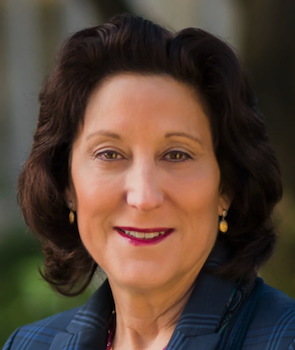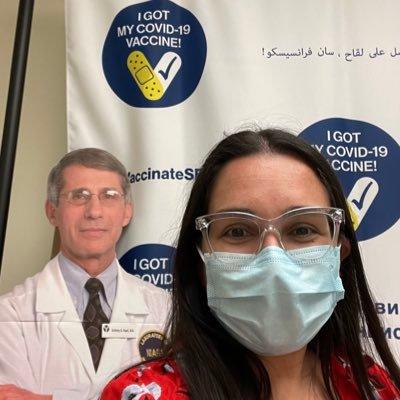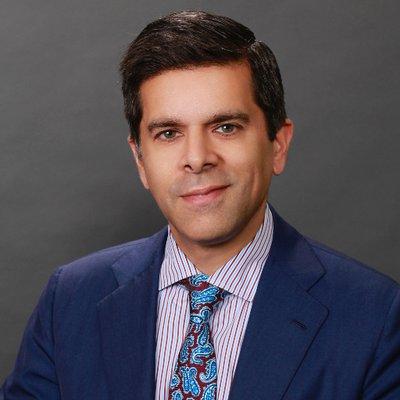
Launched 15 years ago this week, Twitter has become one of the most powerful ways in the world to spread ideas. In its relatively short lifetime, Twitter’s reach and ability to influence have made it a critical communication tool in all areas of life and work.
Who tweets, and why?
At UCSF, a range of physicians, scientists, staff, fellows, postdocs, and students tweet to bolster scientific dialogue and discovery, to network with peers, to interpret research to patients and advocates, to consider health policy, and to champion health equity. Approximately one-third of our 400+ Cancer Center members tweet regularly.
UCSF Cancer Center Twitter users share a mix of content, largely specific to their roles. Scientists and lab staff discuss current research, share events, and funding and job opportunities. A 2020 survey of hem/onc fellows found that 46% use Twitter for professional activities, including education and networking. Many oncologists use Twitter to provide insight on new treatment recommendations and clinical trials to patients and advocates using healthcare hashtags to connect around disease types (#ChildhoodCancer, #Myeloma, #metastaticBC), events (#ASCO21, #WorldCancerDay), or initiatives (#HealthEquity, #CancerDisparities).
Share This Tweet
On Twitter? Trying copying, pasting, and posting the following tweet:
Twitter remains a vibrant communication tool for our @UCSFcancer community. Read how: http://ow.ly/2Oby50FxBKO
Reputation, Rankings, Data, and Influence
Increasingly, physician use of Twitter can enhance both personal and institutional reputation. In 2018, the Social Oncology Report by WOG found that for every 20 doctors an institution adds to Twitter, they could reasonably expect to add, on average, a percentage point in reputation score to their US News & World Report ranking. As Twitter use has grown among oncologists, UCSF cancer experts have increased their influence.
Hematologist Aaron Logan, MD—@hemedoc since 2009—was named among the top five Key Influencers of #ASCO2016, and recently listed in the top twenty Digital Opinion Leaders in Blood Cancer. In 2020, ASCO selected Ana Velázquez Mañana, MD—@anaVmanana since 2018— as one of ten Featured Voices for the #ASCO20 Ed Program. Recently UCSF breast oncologist Hope Rugo, MD—@hoperugo since 2012—was dubbed #19 of the Top 100 Most Influential Oncologists on Twitter. The industry poll declared there were "almost 500 tweets every week posted by verified oncologists related to trending news in cancer research, trials, treatments, and drug development and these Digital Opinion Leaders (DOLs) have emerged as an important voice in the community."
Cancer researchers and oncologists are increasingly using Twitter as a data source. At the 2019 Promoting Research in Social Media and Health (PRISM) conference, founder and conference chair, Urmimala Sarkar, MD, MPH highlighted how publications in the field of social media and health research have skyrocketed from just a handful in 2010 to nearly 6000 published in 2019. Dr. Sarkar—@UrmimalaSarkar since 2009—notes "social media is an exciting new space to learn about health behaviors and attitudes in ways that avoid the response bias in traditional research methods."
As with tele-health, increased social media use during the pandemic is likely to remain a staple of, rather than a replacement for, in-person contact. A recent study led by UCSF Hem/Onc Fellow Rahul Banerjee, MD—@RahulBanerjeeMD since 2009— examined how Twitter facilitated information flow and professional networking during virtual-only conferences, and concluded "the ability of Twitter to enable uninterrupted information exchange has reinforced its central role in medical and scientific communication in a way that will outlive the COVID-19 pandemic."
Twitter is likely to remain a vibrant communication tool for our UCSF cancer community.
The Real Deal: UCSF Cancer Experts Who Tweet
We asked a few of our top tweeters (Tweeps) to share how they use the platform and any tips for peers who may be on the fence about getting started.
"Tweet about new interesting data you see – you will be surprised at how much feedback you get, and how this can generate useful discussions"

Hope Rugo, MD
@hoperugo
Joined August 2012
A direct benefit that you can attribute to your Twitter use?
Ongoing communication with colleagues through the pandemic.
Highlight new papers, press releases about important clinical and translational data.
Share often in-depth interpretations of new data with many colleagues around the world.
These topics improve knowledge and interpretation, which impacts clinical and academic work in real time.
Best practice for Twitter?
Check your Twitter feed at least once a week
Tweet about new interesting data you see – you will be surprised at how much feedback you get, and how this can generate useful discussions
Highlight upcoming meetings or presentations you think might be of interest – by doing this you help your colleagues and hear about things you are interested in too.
One great addition to big meetings like ASCO is listing the top abstracts to look out for – this has been a fun discussion this year.
A favorite account to follow?
I don’t think I have a favorite account, but there are colleagues who are more prolific and relevant that others. I follow the main journals for cancer, as that way you see articles early and this is helpful.
Congratulations @ISPY2trial & Lajos Pusztai on the publication in Cancer Cell: Durvalumab with olaparib and paclitaxel for high-risk HER2-negative stage II/III breast cancer: Results from the adaptively randomized I-SPY2 trial.https://t.co/p9GrIgEOAu @UCSFCancer @OncoAlert
— Hope Rugo (@hoperugo) June 18, 2021
"For about 15 minutes a day on Twitter, I’m plugged in to the most stimulating and innovative minds on so many topics, from science to policy to advocacy. All delivered in real time, not months or years later..."
A direct benefit that you can attribute to your Twitter use?

Tung Nguyen, MD
@ARCHDrNguyen
Joined June 2013Twitter is the most efficient way I know to engage with people OUTSIDE my own sphere of work.
Even though people think of Twitter as taking up too much time, I would ask them to think about the 72+ hours they spend on traveling to meetings to present and how much networking and intellectual growth they get out of that.
For about 15 minutes a day on Twitter, I’m plugged in to the most stimulating and innovative minds on so many topics, from science to policy to advocacy. All delivered in real time, not months or years later as is the case with presentation and papers.
And the reverse is true—many more people hear what I have to say than normally come to my presentations or read my papers.
Best practice for Twitter?
Set up different channels/groups to follow. That way, if I get busy, I can skip some of the more peripheral people and catch up on those most important to me. I definitely follow the key journals—most of us don’t have time to look at journals directly anymore, so this is a good way to stay on top. Apps or websites like Hootsuite or TweetDeck are crucial.
Learn the key # hashtag for you and your area. This is a way for people who don’t normally look for you to find you. For me, #diversity #healthequity #healthdisparities #MedTwitter are good ones to use. I don’t always follow those # myself because the feed can get overwhelming.
If people starting out don’t know what to tweet, just think about what you may say about your work to any other group of people. Sometimes, that’s just tweeting out your latest abstract. The Twitter limit on characters does force you to think about what is the most important thing about the work that you want to say, but that’s no different than an elevator pitch, and it’s an important skill. PRO TIP: You can also bypass the character limit by replying to own tweet so that 3 or 4 tweets can be strung together to get the point across. And you can always attach a figure or graph or table to the Tweet to give even more information.
A favorite account to follow?
For patient care: @gradydoctor (Kimberly Manning). She’s a professor at Emory who is just so very genuine in the way she tweets about her patient interactions, with the added bonus of seeing it all through the lens of being a Black woman doctor, often working with Black patients.
For COVID-19: @DrEricDing: he’s totally on top of what’s happening with COVID-19 across the globe epidemiologically, but he’s acerbic and not afraid to let his opinions come through. I find these are the best kind of Twitter users—the ones you can rely on for science and facts but who’s not so fearful of some bogus “impartiality” rule on scientists.
Genuinely asking here for those who do health intervention work: what words are you using to replace "targeted intervention"?
— Tung Nguyen (@ARCHDrNguyen) May 10, 2021
Was taught that "tailored" was for individuals (seems ok still) and "targeted" for populations, which now feel completely wrong.
"Keep it professional and not political"
A direct benefit that you can attribute to your Twitter use?

Nina Shah, MD
@ninashah33
Joined June 2013
Immediate awareness of any new and important finding in multiple myeloma research
A best practice for Twitter for your peers?
Keep it professional and not political
A favorite account to follow?
Love following Dr. Mark Lewis (@marklewismd) — a witty oncologist and cancer survivor. He should write for a comedy show…
“MonumenTAL” data! Talquetamab GPRC5D-CD3 bispecific, weekly SC, 27% prior BCMA tx (!!). Low g CRS/skin tox ~70%. ORR 70% at RP2D. Some pts with >22 mo responses in IV cohort! Time to get our #myelennial on and double target BCMA + GPRC5D. congrats to @BerdejaJesus #mmsm #ASCO21 pic.twitter.com/GyFylGraGL
— Nina Shah (@ninashah33) June 8, 2021
"As junior faculty, I made contacts with major news reporters who would ordinarily have been talking to my senior colleagues"
A direct benefit that you can attribute to your Twitter use?

Matt Cooperberg
@dr_coops
Joined September 2010Meeting and staying in touch with colleagues in a truly global community
Disseminating novel findings much faster than possible with traditional media
As junior faculty, I made contacts with major news reporters who would ordinarily have been talking to my senior colleagues
Best practice for Twitter?
Be original, pithy, and aim for a little humor but not too much
Don’t shy from controversy but always be respectful; remember tone and intent are not always clear in 280 characters
Don’t mix professional and personal posts in an account
Anything you post is FOREVER; you never know what’s been screenshot before you can delete it
Never EVER post PHI (or anything that even approaches PHI)
A favorite account to follow?
…whoever is modeling the above the best!
Great to see. But I do take a bit of issue with "NCCN, CAPRA, AJCC" both here & in the paper. CAPRA has outperformed NCCN and other risk groups for 15+ years in dozens of validation studies. STAR-CAP did better here, but only by a bit, and at the cost of much more complexity. https://t.co/PXuyel2Sem
— Matt Cooperberg (@dr_coops) June 24, 2021
"Networking, networking, networking. Through Twitter I have found collaborators and recruited participants to projects, have been invited to collaborate on projects, and sit on committees and panels."
A direct benefit that you can attribute to your twitter use?

Ana Velázquez Mañana, MD, MSc
@AnaVManana
Joined March 2018
Networking, networking, networking. Particularly as a trainee in the absence of in-person conferences we lack networking opportunities. At this stage of our careers, meeting faculty and trainees at other institutions is key to our career development, future job hunt, and search of mentorship.
Twitter also helps us build a brand and highlight your expertise and ultimate career goals. Through Twitter I have found collaborators and recruited participants to projects, have been invited to collaborate on projects, and sit on committees and panels.
Also, I've learned of funding opportunities for my research, and most importantly it allows me to keep up to date with the rapidly evolving field.
Best practice for Twitter?
Don't be shy! Be present and engage with the #MedTwitter community. Comment, interact with others, and show your opinions and expertise.
A favorite account to follow?
One of my favorite accounts to follow is Dr. McLemore, she is an inspiration, a force of nature, and a true equity warrior | Monica McLemore PhD, MPH, RN, FAAN #Blaccinated (@mclemoremr)
❤️ Can’t believe @ASCO OSI is over!
— Ana Velázquez Mañana MD MSc (@AnaVManana) July 10, 2021
Super thankful to Gerald Hsu for his support & embarking w/ me on this adventure!
🙏🏽 @ASCO staff, @UCSFCancer faculty, residents, fellows, and most importantly our #medstudents who always teach us so much!
🔥The future of #oncology is bright! pic.twitter.com/3Kf5g3OuGE
"Intentionally follow women and people of color in academia...unless people deliberately engage diverse voices, those voices go unheard."
A direct benefit that you can attribute to your Twitter use?

Urmimala Sarkar, MD, PhD
@UrmimalaSarkar
Joined July 2009
I asked people on Twitter to send us COVID misinformation they’d gotten within the South Asian diaspora, and we ended up with really interesting data
Best practice for Twitter?
Intentionally follow women and people of color in academia. There’s data showing women do not gain as many Twitter followers even with the same engagement, and that women academics do not get the same benefits from Twitter as men. So unless people deliberately engage diverse voices, those voices go unheard.
A favorite account to follow?
I like the account @YourPaperSucks because it pairs actual peer review comments to memes. It’s remarkable what people put into peer review!
This is why we're studying #COVID19 #misinformation via WhatsApp and Signal messages across the #SouthAsian diaspora. It's real and consequential. https://t.co/YEWHuiXvXy
— Urmimala Sarkar, MD, MPH (@UrmimalaSarkar) May 11, 2021
"Be specific in your posts – use the full word limit and don’t just cheer someone on but highlight exactly why their work will impact your field of study"
A direct benefit that you can attribute to your Twitter use?

Manish Aghi, MD, PhD, MAS
@ManishKAghi
Joined September 2017I find my Twitter usage has dramatically expanded my professional network 10- to 20-fold, creating a network for collaborations that has been very useful.
I have also had trainees ask about joining my research group based on learning of our work on Twitter and have been invited for speaking engagements based on my Twitter profile.
Best practice for Twitter?
My suggestions for best Twitter practice for my peers are to stay positive and upbeat in your postings, highlight your colleagues and trainees as much as you highlight yourself, and be specific in your posts – use the full word limit and don’t just cheer someone on but highlight exactly why their work will impact your field of study.
A favorite account to follow?
My favorite account to follow is @NCIResearchCtr in terms of learning about the latest research and funding opportunities.
Great work by @NeurosurgUCSF resident @JohnPAndrews_MD analyzing our institutional PIT-1 positive pituitary adenomas using a data set developed by three 4th year med students who are now neurosurgery residents - @MattPPereira , @AF_Haddad , and @RushiSJoshi7 https://t.co/I2OVVfrxne
— Manish Aghi, MD PhD (@ManishKAghi) June 29, 2021
"I stick to discussing scientific and professional issues only. I never discuss patients or my clinic on social media."
A direct benefit that you can attribute to your Twitter use?

Sue Yom, MD, PhD
@sueyom
Joined April 2012Twitter is useful for catching up on major national appointments, new scientific literature that’s just come out, or meeting or webinar information. (I don’t find much outside of that to be useful.)
Best practice for Twitter?
I do not use Twitter for personal or sensitive information. I stick to discussing scientific and professional issues only. I never discuss patients or my clinic on social media.
A favorite account to follow?
I like subscribing to San Francisco oriented channels such as @sfchronicle and @BayCity_Beacon to keep up on local news, and I follow what is the equivalent of a news channel on the topic of COVID, @Bob_Wachter.
See a very well informed, proactive editorial by TJ Fitzgerald on the issue of proton therapy approvals for young adultshttps://t.co/d87nCm5DhB
— RadiationMD (@sueyom) July 15, 2021
While you're at it, check out the August 1 issue, notable for numerous very interesting letters to the editorhttps://t.co/tzKQdbFH69
Use Cases
Take a look at these sample tweets that exemplify typical posts from our members.
Twitter Use Case #1: Amplifying Community Partners
TY Anne Kavanagh for capturing the essence of what is needed to reach #healthequity. #Umoja (oneness), #Intentionality & action. 🙏🏾 to @UmojaHealth partners & all the volunteers @kevinepps @AJBurleson3 @Ghilamichael @ZSmith226 #EvaPardo
— Dr. Kim (@kfrhoads)
🤜🏾🦠🤛🏽 #teamworkmakesthedreamwork https://t.co/bh44RZRH8J pic.twitter.com/U33LBamt6U
Twitter Use Case #2: Amplifying Study Findings
Dispel myths. Our study 👇 showed that African American men were more likely to report prior research participation (both behavioral and biological) than white men. @PalmerNynikka @UCSFCancer https://t.co/MsEwkIGGn4
— Hala Borno (@HalaBorno)
Twitter Use Case #3: Announcing Breakthroughs
It’s time to change this slide! @FDA approval today of #sotorasib. Congrats @JonathanOstrem & Ulf Peters on launching the successful attack with tethering from @realJimWells and scientists at Wellspring! Many steps-great to see the summit reached!! @UCSFCancer @HHMINEWS pic.twitter.com/JSNYXUUspP
— Kevan Shokat (@kevansf)
Twitter Use Case #4: Reporting from Conferences
The day is finally here two years later! I hope to see you all in the chat where our speakers Drs. Cynthia Brown, Supriya Mohile @rochgerionc, and Dalane Kitzman @PepperOAIC will answer your ?s about failure and persistence in aging research. #AGS21 #NeverthelessWePersisted https://t.co/ysdqQWwmSn
— Melisa Wong, MD, MAS (@melisawongmd) May 15, 2021
Twitter Use Case #5: Recruitment
The Goga Lab is hiring! We are seeking research assistants/specialists to join projects focusing on cancer heterogeneity, immunology, and metastasis. Learn more about the positions and how to apply here! Please RT! @UCSF @UCSFCancer #jobs #science #Cancer https://t.co/Mcvys2H8CS
— Goga Lab (@goga_lab)
Twitter Use Case #6: Honest Reflection
Science is competitive. Many people who go into science and related fields push themselves very hard to achieve. One of the most challenging things for me as I move through career stages has been comparing myself to others. 1/
— Stephen Floor (@stephenfloor) July 14, 2021
Twitter Use Case #7: Promoting Your Work
#MedTwitter I’m excited to share a project near and dear to my ❤️ : Huppert’s Notes!https://t.co/wyoGwocafm
— Laura A Huppert (@laura_huppert) May 10, 2021
A thread 🧵... pic.twitter.com/ztXmRJ9YaV
Twitter Use Case #8: Promoting Peers' Work
A tour de force @ShainLab ! Will lead to better treatments for this poorly understood skin cancer @UCSFCancer https://t.co/uNeQkpdZmZ
— Adil Daud (@ad1600) July 16, 2021
Twitter Use Case #9: Sharing Your Passion
Since the moment I first saw the brain of a patient with a glioma I wanted to understand how brain cancer interacts with neural circuits and if these interactions impact outcome. We are beginning to understand. @NINDS @RWJF #gliomaNS @michelle_monje @DavidJBrang @LabRaleigh https://t.co/iDboogVYCM
— Shawn Hervey-Jumper (@HerveyJumper) February 20, 2021
Twitter Use Case #10: Polls Foster Dialogue
Ok, urotwitterati, spot poll following @uretericbud' s tweet and discussion:
— Matt Cooperberg (@dr_coops) April 20, 2021
Would you randomize men with high-risk disease to a LND/no LND trial? #pcsm @wandering_gu @daviesbj @UroDocAsh @mdallera @gpalapa2